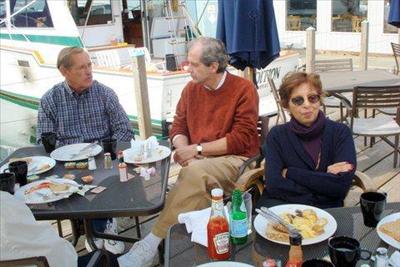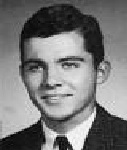In Memoriam
Mark Robie M.H. Palmer

Mark Robie Palmer

Mark Robie Palmer
1963 graduation
from the Wahington Post:
Mark passed peacefully at home on January 28, 2013. He was the Beloved husband of Dr. Sushma Mahyera Palmer, and the Loving son of the late Captain Robie E. Palmer (USN, Ret.) and the late Katherine Hooker Palmer. Mark was the Devoted brother of Georgiana Palmer Cheney (George) and the late Alexandra Palmer. He was the Fond son-in-law of Santosh Mahyera and brother-in-law of Meena Pandit (Jatinder), Anil Mahyera (Elka) and Rohit Mahyera (Shivani). Mark is survived also by nieces and nephews, Hooker Cheney (Emmi McLean), Andrew Cheney (Kerry Armstrong) and Diamante Smith (Peter), Neha Ahluwalia, Tristan Mahyera (Birte) and Alexis Mahyera, Shiraz Mahyera (Anna) and Rohani Mahyera. and nine grandnieces and grandnephews. A memorial contribution may be made to Freedom House or the Council for a Community of Democracies or a charity in Mark's name selected from Favorite Charities.
from Jon Larson:
Mark was yet another of those massive forces of nature that I totally missed connecting with during my undergraduate years at Yale along with so many of the other fabulous 1000+ men in our class with whom I failed to make a personal connection. Totally my own overly narrow focus, and nothing to do with Mark’s abilities already on display at Yale in his Russian studies program which he put to immediate good use in the Foreign Service of our country.
I discovered this yet again in preparing this In Memoriam section to be posted to our class web site, I took the time to read his piece in our Yale 1963 at 50 class book. What an amazingly talented, serious and accomplished man he was, what an interesting life he led, and how he compartmentalized his post Yale years into three careers, each different from the other.
He walked in the face of evil everywhere he perceived it existed, and stared it down cold. A quote from his piece is included here.. “What is the central lesson which Yale and my three “careers” have taught me? The twentieth century was the bloodiest in human history because dictators made it so (Hitler, Stalin, Mao, Pol Pot, et. al.). With nuclear weapons increasingly available to them, the world’s remaining dictators — about twenty percent of the total number of leaders as of this writing — could make the twenty-first century orders of magnitude more devastating. Look around: dictators are behind or in front of every “evil” in the world today. The centerpiece of American and all democratic governments’ foreign policies should be to make them an extinct species — to move aggressively and largely through non-violent means to complete the creation and maintenance of a “dictatorfree world”.
He wrote this as he faced the end of his brave six year fight against melanoma cancer that he described in his piece prepared for our 50th reunion class book that he knew he could not attend due to failing health, and then his passing several months thereafter and before the reunion itself. Bravery, thy name is Mark (Robie M.H.) Palmer.
from our YAM November-December issue:
A special forum on democracy was held in Washington DC on July 14, 2014, the birthday of our late classmate Mark Palmer, to honor Mark's vision and his legacy in promoting the establishment of democratic institutions and practices around the world. The forum was hosted by the Council for a Community of Democracies (CCD), a leading democracy NGO which Mark served as Vice President of the Board of Directors, and was moderated by our classmate Steve Steiner. Over 40 democracy experts and activists and close professional associates of Mark took part in this special forum, which was planned as the informal start to a series of substantive events that will seek to advance and institutionalize Mark's inspiring legacy in this field. Participants noted, among other things, Mark's leading role in the establishment of the National Endowment for Democracy and its network of democracy institutions, as well as his leadership, as United States Ambassador to Hungary, in giving moral support to the Hungarian democracy activists who opposed and eventually brought down the Communist regime. Mark later led the way, under CCD auspices, in the publication of a “Diplomats Handbook on Democracy Advancement”, which numerous governments now use as a training manual for their diplomats. Subsequently, Mark also led the way in the publication of a similar practical handbook for military officers around the world. The next step in efforts to advance and institutionalize Mark’s legacy will be a forum hosted in Washington by Freedom House on September 15, which will focus on the state of governance in Russia and the repercussions of Russian actions in Ukraine on Eastern Europe, the Caucasus and Central Asia. This will be followed by future forums which address, among other key international issues, the state of Internet freedom and the crises in the Middle East.

